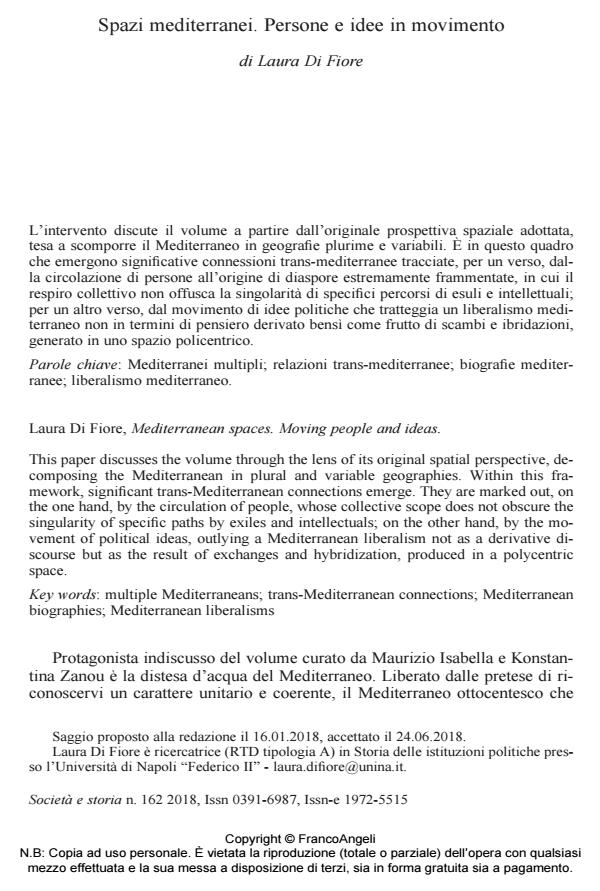Mediterranean spaces. Moving people and ideas.
Journal title SOCIETÀ E STORIA
Author/s Laura Di Fiore
Publishing Year 2018 Issue 2018/162 Language Italian
Pages 9 P. 813-821 File size 34 KB
DOI 10.3280/SS2018-162006
DOI is like a bar code for intellectual property: to have more infomation
click here
Below, you can see the article first page
If you want to buy this article in PDF format, you can do it, following the instructions to buy download credits

FrancoAngeli is member of Publishers International Linking Association, Inc (PILA), a not-for-profit association which run the CrossRef service enabling links to and from online scholarly content.
This paper discusses the volume through the lens of its original spatial perspective, decomposing the Mediterranean in plural and variable geographies. Within this framework, significant trans-Mediterranean connections emerge. They are marked out, on the one hand, by the circulation of people, whose collective scope does not obscure the singularity of specific paths by exiles and intellectuals; on the other hand, by the movement of political ideas, outlying a Mediterranean liberalism not as a derivative discourse but as the result of exchanges and hybridization, produced in a polycentric space.
Keywords: Multiple Mediterraneans; trans-Mediterranean connections; Mediterranean biographies; Mediterranean liberalisms
- AHR Conversation (2013): How Size Matters: The Question of Scale in History, in «American Historical Review», 3, pp. 1431-1472.
- Bartolini F. (2012), Spazio «naturale» e spazio politico. Le geografie dei federalisti nel Risorgimento, in Movimenti e confini. Spazi mobili nell’Italia preunitaria, a cura di L. Di Fiore, M. Meriggi, Roma, Viella, pp. 199-214.
- Bayly C. (2004), The birth of the modern world, 1780-1914. Global connections and comparisons, Blackwell, Oxford. Brice C., Aprile S. (a cura di) (2013), Exil et fraternité au XIXe siècle, Pompignac près Bordeaux, Editions Bière.
- Brickell K., Datta A. (a cura di) (2011), Translocal Geographies. Spaces, Places, Connections, Farnham, Ashgate.
- Conrad S. (2015), Storia globale. Un’introduzione, Roma, Carocci (ed. orig. 2013).
- De Francesco A. (2012), La palla al piede. Una storia del pregiudizio antimeridionale, Feltrinelli, Milano.
- De Vito C. (2015), Verso una microstoria translocale (micro-spatial history), in «Quaderni storici», 3, pp. 815-833.
- De Vito C., Gerritsen A. (2018), Micro-spatial histories of global labour, London, Palgrave Macmillan.
- Di Fiore L. (2016), Geografie dell’eversione, spazi del controllo. La polizia politica nel Mezzogiorno all’indomani del 1848, Le Carte e la Storia, 2/2016, pp. 86-102.
- Diaz D., Moisand J., Sanchez R., Simal J.L. (a cura di) (2015), Exils entre les deux mondes. Migrations et espaces politiques atlantiques au XIXe siècle, Mordelles (Ille-et-Vilaine), Les Perséides.
- Epple A. (2012), The global, the Transnational and the Subaltern. The limits of history beyond the National Paradigm, in Beyond Methodological Nationalism: Research Methodologies for Cross-border Studies, Amelina A. et. al. (rds.), New York, Routledge, pp. 155-175.
- Falcetta A. (2016), Ortodossi nel Mediterraneo cattolico Frontiere, reti, comunità nel Regno di Napoli (1700-1821), Viella, Roma.
- Games A. (2006), Atlantic history: definitions, challenges, and opportunities, in AHR Forum: Oceans of History, in «The American Historical Review», 111, 3, pp. 741-757.
- Horden P., Purcell N. (2006), The Mediterranean and «the new thalassology», in AHR Forum: Oceans of History, in «The American Historical Review», 111, 3, pp. 722-740.
- Leonhard J., von Hirschhausen U. (2014), Imperi e stati nazionali nell’Ottocento, Bologna, il Mulino.
- Lucrezio Monticelli C. (2018), Roma seconda città dell’impero. La conquista napoleonica dell’Europa Mediterranea, Roma, Viella.
- Matsuda M.K. (2006), The Pacific, in AHR Forum: Oceans of History, in «The American Historical Review», 111, 3, pp. 758-780.
- Meriggi M. (2014), Legitimism, liberalism and nationalism: the nature of the relationship between North and South in Italian unification, in «Modern Italy», 19, (1) (The Italian Risorgimento: transnational perspectives), pp. 69-79.
- Nordman D. (2015), Territoire, in Dictionnaire de l’historien, Paris, PUF, pp. 698-701.
- Osterhammel J. (2015), The transformation of the world a global history of the nineteenth century, Princeton, Princeton University Press (ed. orig. 2013).
- Pécout G. (2013), Presagi dell’“invenzione del Mediterraneo” nell’Età napoleonica, in Storia dell’Europa e del Mediterraneo, vol. XII, Popoli, stati, equilibri di poteri, a cura di R. Bizzocchi, Roma, Salerno Editore, pp. 893-943.
- Pinto C. (2014), La “guerra civil borbónica”. Crisis de legitimidad y proyectos nacionales entre Nápoles y el mundo iberoamericano, in Entre Mediterráneo y atlántico, circulationes, conexiones y miradas, 1756-1867, a cura di A. De Francesco, L. Mascilli Migliorini e R. Nocera, pp. 341-360, Santiago, Chile, Fondo de Cultura
- Económica. Romanelli R. (2006), L’impero nell’età degli Stati, in «Ricerche di storia politica», 3/2006, pp. 315-322.
- Trivellato F. (2011), Is there a future for Italian Microhistroy in the Age of Global History?, in «Californian Italian Studies», 1, 2011, p. 1-26.
- Wigen K. (2006), Introduction, in AHR Forum: Oceans of History, in «The American Historical Review», 111, 3, pp. 717-721.
Laura Di Fiore, Spazi mediterranei. Persone e idee in movimento in "SOCIETÀ E STORIA " 162/2018, pp 813-821, DOI: 10.3280/SS2018-162006